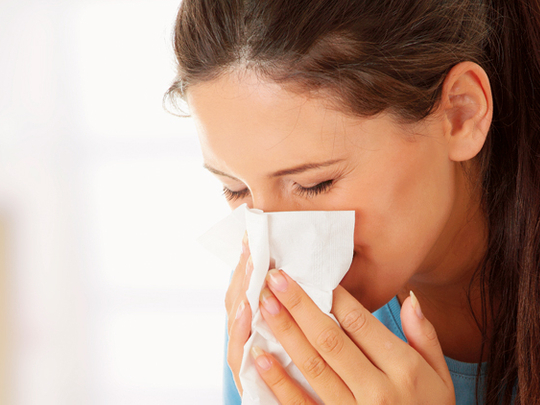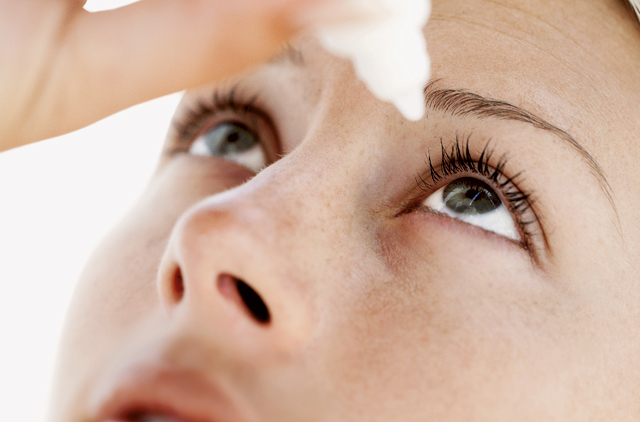
The mercury has been hovering in the mid-30s, the fog has begun making its presence felt in the mornings; the evenings are seeing a lot more people outdoors… all this can only mean one thing - winter is just around the corner. While it's a season almost everyone has been waiting to welcome, winter also brings with it its own set of health concerns, with allergies ranking high on the list.
"There are seasonal allergies that occur only when the weather changes and there are perennial allergies that plague us throughout the year," says Dr Abey Abraham, specialist physician at Aster Medical Centre, Sharjah. "In this region, the winter months usually bring sandstorms and rains that can trigger allergies in susceptible people."
Some people can even develop an allergy when exposed to the cold weather, he adds.
"The most common winter allergies that we come across in the UAE are allergic asthma, allergic rhinitis or hay fever, urticaria and angioedema," Dr Abraham says. "People living in this region are susceptible to allergies as they tend to stay indoors 90 per cent of the time [due to the harsh weather]. Indoor air quality plays a big role as allergies can be triggered by dust mites, pet dander, perfumes and micro-organisms living in air-conditioning vents, among other things," he says.
So the million-dirham question is, who is susceptible to allergies?
If one parent has allergies, you have a 30 per cent chance of having allergies. And if both your parents have allergies then the odds go up substantially.
However, it's not necessary that only people with a family history develop allergies, says the doctor. Just about anyone can have them.
Sadly, most of the time, years pass before people realise they have an allergy and they continue to suffer unnecessarily.
"During winter it's a common sight to see people suffering from bouts of sneezing, a running or blocked nose and watery eyes. These are not just due to viral infections, but could also be due to weather changes, being exposed to mould spores and dust in packed winter clothing that is taken down at the beginning of the winter season, mould and dust from the air-conditioning vent, among other things," Dr Abraham says.
So if you suffer from the same problem during a particular season year after year, chances are you might be suffering from an allergy. In such cases, it makes perfect sense to visit a doctor who will be able to establish whether you are suffering from an allergy rather than taking over-the-counter medication, which at best only calm the symptoms without curing the condition.
The doctor will suggest that you do a simple patch test to find out if you are having an allergic reaction, after which he will work towards narrowing down your allergy triggers.
There are a number of treatment options to help those suffering from allergies. For instance, there are medicines that can block histamines that trigger allergic reactions.
You can also get allergy shots that will help reduce reactions to allergies over time.
Dr Abraham says: "Immunotherapy [allergy shots] is given to increase tolerance to allergens. But these are recommended in cases of severe allergy only. In the case of mild allergies, prevention is the best cure. Those susceptible to allergies must avoid exposure to all known allergens like dust, cold outdoor air and mould spores, and known food allergens."
He suggests that extra care be taken when cleaning bathrooms to ensure moulds do not develop.
"Using a dehumidifier or particulate air filter in the house would help. If possible, open the windows of homes and offices for 15 minutes daily to improve air circulation and the quality of indoor air. Also, make sure that regular maintenance of the air conditioner's air vents is done in the building."
Whatever the allergy is, you will be able to beat it with some precaution and help from your doctor. So stay healthy this season to make the best of what the UAE's winter months have to offer.
Causes and precautions
Four common allergic reactions...
1. Allergic rhinitis
Symptoms: Sneezing, runny nose with a clear, thin discharge, stuffy nose, a sensation of plugged ears, watery, bloodshot eyes and itching of the nose, soft palate and ear canal.
Causes: Pollen and mould spores are triggers.
Precautions:
- Keep doors and windows closed during strong winds to keep out pollen.
- Vacuum your house and dust regularly with a damp cloth to remove any lingering pollen or mould spores.
- Use a little vaseline inside your nose as it stops pollen and mould spores from getting to the lining of your nose.
- Stay away from pets as pollen and mould spores can collect on their fur.
2. Urticaria
Symptoms: Red, itchy, lesions form on different parts of the body.
Causes: Urticaria can be triggered by exposure to cold, heat, pets, horses and latex rubber.
Precautions:
- Keep the skin cool, avoid strenuous exercise. Take lukewarm baths.
- Avoid foods containing additives like sodium benzoate, sulphite, colourings and salicylate.
3. Allergic asthma
Symptoms: Persistent coughing with the cough getting worse at night or in the morning. Wheezing, tightness in the chest and shortness of breath.
Causes: Allergic asthma can be triggered by cold air and outdoor exercise in winter. Allergens in the environment like dust mites, mould spores, pollen, cigarette smoke, candles and incense can bring on an attack. Cockroach droppings, eggs and saliva also contain allergens.
Precautions:
- Cover mattresses and pillows in allergic casings.
- Don't allow animals into the bedroom.
- Avoid all kinds of smoke.
4. Angioedema
Symptoms: A swelling develops below the surface of the skin due to a collection of fluid in the deep layers of the skin. It most often affects the hands, feet, eyes, lips or genitals. In severe cases, the inside lining of the throat and bowel can be affected. It usually lasts one to three days.
Causes: Exposure to cold, wearing tight clothes. Other triggers include nuts, shellfish, milk, eggs, aspirin, penicillin, insect bites and latex.
Precautions:
- Wear loose, light clothing.
- Work closely with your doctor to determine your allergens and then avoid the triggers.
- Seek your doctor's advice before taking any medication.
- Avoid medication that contains aspirin. Stick to paracetamol if you need a painkiller.
Reena Amos Dyes is a Sharjah-based freelancer












